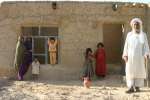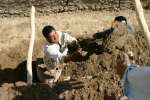UNHCR calls for international push to end Afghanistan refugee situation
News Stories, 25 June 2015
ISLAMABAD, Pakistan, June 25 (UNHCR) – The head of the UN refugee agency has called on the international community to redouble its engagement with Afghanistan to help bring an end to the world's largest protracted refugee situation.
UN High Commissioner for Refugees António Guterres pointed out that reinvigorated and continued engagement was critical to support Afghanistan's nation building and reconciliation processes at a time of dwindling resources and expanding humanitarian needs worldwide.
"Robust development initiatives aimed at creating long-term incentives for durable return and conditions conducive for sustainable reintegration in Afghanistan are vital to create pull factors and allow for inclusion, participation and active contribution of returning Afghans, particularly the youth," he said.
Guterres was speaking at a joint press conference with Pakistan's Minister of States and Frontier Regions Abdul Qadir Baloch at the end of a three-day Ramadan solidarity mission to Pakistan. He flew out on Thursday.
The UN refugee chief noted the future of some 2.6 million Afghan refugees in the region, many of whom have been living outside their country for over three decades, still hung in the balance while fresh emergencies in the Middle East and Africa competed for global attention.
Praising Pakistan's goodwill and hospitality as a host nation, Guterres noted that "the unwavering generosity of Pakistani people towards Afghan refugees has contributed to regional stability but also more broadly to the global refugee cause at a time when we witness increased asylum fatigue worldwide."
However, Guterres stressed that 2015 was a pivotal year for Afghanistan, offering unprecedented opportunities to pursue innovative and lasting solutions for Afghan refugees in the region.
"Traditional approaches are no longer sufficient to fully capitalize on the potential for solutions in 2015 in view of prevailing challenges in Afghanistan … in an environment of shrinking humanitarian resources, it is vital to pursue innovative solutions and creative joint advocacy and resource mobilization," he added.
The High Commissioner said he was encouraged by the new National Unity Government of Afghanistan for their ownership and commitment to sustainable return and reintegration of refugees and he repeated calls for the international community to support those efforts.
"It is critical that the international community steps up to support the Afghan government in their efforts to create adequate conditions for Afghans to return home and restart their lives in safety and dignity," he said.
Pakistan is currently hosting 1.5 million registered Afghan refugees; the largest protracted refugee population globally, of which 67 per cent live in urban and peri-urban areas, while 33 per cent remain in special refugee villages. Within Pakistan, some 1 million registered Afghan refugees reside in the Khyber Pakhtunkhwa province.
Since 2002, more than 3.8 million Afghan refugees have returned home from Pakistan, assisted through the largest voluntary repatriation programme in UNHCR's history.
Complementary to robust community based development initiatives in Afghanistan, the introduction of an Enhanced Voluntary Return and Reintegration Package (EVRRP) can help stimulate voluntary repatriation and support sustainable reintegration of Afghan refugees, as the preferred solution and key objective of the Solutions Strategy for Afghan Refugees which enters the second stage of its implementation in 2015-17.
Pro-active joint resource mobilization with non-traditional and traditional donors, led by the Government of Afghanistan, supported by the Government of Pakistan and facilitated by UNHCR is being pursued to secure funding for the implementation of EVRRP and the overall Solutions Strategy for Afghan Refugees. As an important first step in these efforts, a joint mission to the Gulf Cooperation Council countries is planned for the end of August 2015.
During the three days, Guterres held a series of meetings with senior Pakistani officials including Prime Minister Nawaz Sharif and President (ai) Raza Rabbani as well as provincial authorities, donor nation representatives, UN heads of agencies, civil society and refugee elders.
By Duniya Aslam Khan, Islamabad, Pakistan




















































